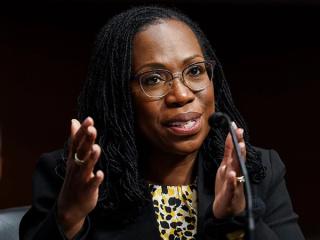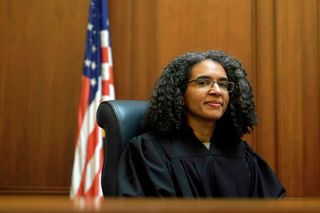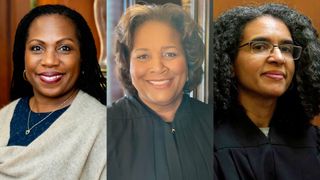Introduction
In early 2020, and many months away from his nomination as the Democrat's presidential candidate, Joe Biden promised, if elected, to appoint the first-ever Black woman to the US Supreme Court. Of the 115 justices to serve on the US Supreme Court, all but seven have been white men. Should Biden come through on his promise, the candidate would not only be the court’s first Black woman but the sixth ever woman and third Black justice in the court’s 232-year history.
President Biden’s recent affirmation that he would “be honored to appoint the first African-American woman” following the retirement announcement of Justice Stephen Breyer in January 2022 is part of Biden’s broader effort to have institutions that “look like America”. Indeed, of the 40 judges Biden nominated in his first year – the most nominations since Ronald Reagan’s first year in office and twice as many as Trump – almost 80 per cent were women, and 53 per cent were people of colour. President Biden’s experience as chairman of the Judiciary Committee between 1987 and 1995 was instrumental in achieving this outcome. During his tenure, he oversaw six Supreme Court justice confirmation hearings, including Breyer’s in 1994.
Should Biden come through on his promise, the candidate would not only be the court’s first Black woman, but the sixth ever woman and third Black justice in the court’s 232-year history.
President Biden is not the first president to incorporate affirmative action into his campaign rhetoric about Supreme Court nominations. During his 1980 presidential campaign, Ronald Reagan promised to nominate a woman and later nominated Sandra Day O’Connor in 1981. At the peak of the 2020 campaign, when Justice Ruth Bader Ginsburg died, President Trump publicly pledged to replace her with another female justice and nominated Amy Coney Barrett eight days after Justice Ginsburg died.
While not always explicitly publicised, other presidents also selected candidates from underrepresented groups. President Dwight Eisenhower expressed his desire for a Catholic justice in 1956; in 1991 George H.W. Bush is believed to have specifically nominated a Black judge (Clarence Thomas) to replace the first-ever Black justice, Thurgood Marshall; and some secret White House recordings imply Lyndon B. Johnson’s appointment of Justice Marshall in 1967 was deliberate.
Biden’s approach to replacing Breyer may not be novel, but it is pragmatic. For one thing, it significantly refines the search for a replacement. Less than five per cent of the nation’s federal judges are Black women. This narrow pool of candidates is similar to Reagan’s nomination of Sandra O’Connor at a time when women of any race represented about five per cent of federal judges. Given these narrow parameters, there’s a ready-made shortlist for who President Biden will nominate. In his first major interview of the new year, the president revealed there has been a “deep dive” on four candidates. Three frontrunners include:
Biden’s Supreme Court shortlist
Judge Ketanji Brown Jackson
Judge Ketanji Brown Jackson is a leading candidate for the vacant spot on the bench. Brown Jackson was nominated to replace Attorney General Merrick Garland’s seat on the US Appeals Court in the DC Circuit in the first year of the Biden administration. Her nomination to the DC Circuit came just six days after Biden’s inauguration and was confirmed on 14 June 2021, after a smooth vetting process that won her the support of all Senate Democrats and three Republican senators in a 53-44 vote.
The Court of Appeals for the DC Circuit is widely considered the ‘second-highest court’ in the United States because its district, while the smallest in the nation, covers the US Congress and several federal agencies and therefore often makes decisions on highly sensitive issues concerning administrative and constitutional law. In her capacity as a DC judge, Brown Jackson sat on a three-judge panel that in December 2021 concluded former president Donald Trump was required to release White House records related to the January 6 riots.
Not only is the DC Circuit notable for its hearing of significant cases, but it is also known as a ‘feeder’ to the US Supreme Court. Three currently-serving Supreme Court Justices – Clarence Thomas (1990-1991), John Roberts (2003-2005) and Brett Kavanaugh (2006-2018) – were elevated to the Supreme Court from the US Court of Appeals for DC.
Judge Ketanji Brown Jackson has all the typical credentials of a Supreme Court justice, with elite postings in three highly sought-after federal clerkships, service as a federal judge, associateships at competitive private law firms and two stints at the US Sentencing Commission – a federal agency responsible for setting guidelines for criminal sentences. She even completed one of her federal clerkships under the retiring Justice Breyer between 1999 and 2000, where she oversaw contentious social issues cases from gay rights to public prayers at high school football events and even partial birth abortions.

In her eight years as a district judge in DC, Brown Jackson heard several high-profile cases including the 2019 case Committee on the Judiciary v. McGahn, which required the former White House counsel to Donald Trump, Don McGahn, to testify before the House Judiciary Committee as part of the investigation into Russian interference in the 2016 election. In her ruling against the former president, Brown Jackson also memorably handed down an unusually long 120-page opinion, which included a seething statement that “presidents are not kings. They do not have subjects, bound by loyalty or blood, whose destiny they are entitled to control.”
While these experiences are typical of a Supreme Court justice, what sets Brown Jackson apart is her two years’ experience as a public defender and her experience at the Sentencing Commission. Should she be confirmed, she would be the only Judge on the bench with experience in criminal defence, and the first since 1991.
Most justices have limited civil and criminal trial experience, and even then, most serve as prosecutors. This is often because the extensive vetting process to confirm the nominations means it is easier to appoint lawyers who have abstained from controversial decisions and simply upheld law and order, rather than those who have to defend alleged criminality.
Ketanji Brown Jackson is especially unique among usual justice candidates, then, in her 2017 decision as Vice Chair of the US Sentence Commission to retroactively lighten the punitive life sentences of those jailed during the ‘three strikes law’ of the 1980s war on drugs era. This decision saw the life prison sentences of 30,000 federal prisoners, including Brown Jackson’s uncle, overturned.
Justice Stephen Breyer, among many other high-profile legal authorities, commended her experience as a public defender as a reason for her career successes. At her swearing in to the US federal courts under the Obama administration in 2013, Breyer commented, “she sees things from different points of view and she can see somebody else’s point of view and understands it.”
Judge Julianna Michelle Childs
Judge J. Michelle Childs is another top contender. Childs’ Senate confirmation hearing for her nomination to the DC Appeals Court on February 1 this year was quietly rescinded amid rumours of Breyer’s retirement, as her candidacy for a role in the top Court is considered. Currently serving as a judge in the US District Court of South Carolina, Judge Childs is also a favourite among Republican Senators Lindsey Graham and Tim Scott who appear eager to have their state represented in the top court.
Like Judge Brown Jackson, Judge Childs has a trailblazing professional career. Her experience spans work in the private and public sector, representing government agencies, as well as spending four years as a court judge on the state level and over a decade representing South Carolina on the US District Court.

Many consider Childs’ extensive work within the state district courts, on both the state and federal level, as an advantage because state district courts attract a wide diversity of cases, from unglamorous and simple criminal offences to cases of national significance. Most recently, Childs served on the redistricting committee for South Carolina and heard challenges surrounding COVID-19 vaccine mandates for federal workers, where she ruled the mandate go-ahead for a nuclear clean-up company on a federal contract.
Judge Childs is also broadly considered the top pick of Representative James Clyburn (D –South Carolina), whose endorsement carries significant clout for President Biden in particular. Not only is Clyburn the Majority Whip (making him the third highest-ranking Democrat in the House and the highest-ranking Black member of Congress), but he is also credited with convincing Biden to pledge the nomination of a Black woman to the US Supreme Court as part of his presidential campaign.
Her appeal as a candidate may also be strengthened by her public education background. Unlike the overwhelming majority of Supreme Court justices (including eight of the nine currently serving), Childs did not receive her law degree from an ivy league school. She received her bachelor’s degree from the University of South Florida on an honours scholarship and her law degree from the University of South Carolina. This puts her in step with Biden, who also broke the trend of presidents from ivy league schools.
Judge Leondra Kruger
Another name floated for the first Black Supreme Court Justice is Judge Leondra Kruger. Kruger currently serves as a justice on the Californian Supreme Court, where her 2014 appointment made her the youngest justice to the state’s top court at 38 years old and the second-ever Black woman. Should Justice Kruger be appointed, she would also be among the youngest justices in the Court’s history at age 45.

Before arriving at the California Supreme Court, Kruger served as principal deputy to the US solicitor general in President Obama’s administration between 2007 and 2013. In that role, she argued 12 cases before the Supreme Court, which is unusual – most Supreme Court justices have not argued cases before the Court prior to their appointment. One particularly notable case was her representation of the Obama administration in Hosanna-Tabor Evangelical Lutheran Church and School v. EEOC, where the Supreme Court unanimously ruled against her controversial argument that federal discrimination laws should apply to religious organisations.
Like Judge Brown Jackson, Kruger carries significant experience in criminal trials settings, not only overseeing a heavy load of criminal cases at the state Supreme Court level but also in her work in private law firms. In her capacity as a justice, she also heard cases of national significance, including a 2019 trial where she joined a unanimous ruling permitting President Trump to appear on the Californian state primary ballot, despite the president’s failure to disclose his personal tax return.
Politics and strategy
The announcement of Justice Breyer’s retirement was not unexpected. In April 2021, the progressive political organisation Demand Justice drove trucks around the US Supreme Court emblazoned with the slogan “Breyer Retire”; and plans for his retirement in early 2022 were also known by senior officials in the White House months before the announcement.
While President Biden and other Democrat members deny pressuring Justice Breyer to announce his retirement, a push for the 83-year-old judge to stand down is understandably enticing for Democrats. Liberal Justice Ruth Bader Ginsberg died while serving on the US Supreme Court in the final months of the Trump administration, after having expected that she would be replaced with another liberal-leaning justice during an assumed Hillary Clinton presidency in 2017. Just days before the 2020 Election Day between Joe Biden and Donald Trump, Ginsberg was replaced with the much more conservative Justice Amy Coney Barrett, firmly tilting the Court’s ideological disposition towards conservatives.
“It’s likely that the next President, whoever she will be, will have a few appointments to make,” Ginsberg said during an interview in 2016.
In this instance, Justice Breyer’s retirement will not tilt the ideological balance of the Supreme Court. Regardless of who is nominated by the President, the Court’s ideological leanings are secure with at least six conservative-leaning judges. Breyer also notoriously insists that his timing is not political. In his most recent book, The Authority of the Court and the Peril of Politics just last year he wrote, “a judge’s loyalty is to the rule of law, not the political party that helped to secure his or her appointment”.
Instead, the timing (before the mid-term elections in November 2022) may more accurately reflect the increasingly painful and polarised nature of confirming Supreme Court nominations in the Senate. In recent years, fewer and fewer senators cross the aisle vote in approval of the other party’s nominee (see table below). Stephen Breyer was confirmed in 1994 with an 87-9 vote – only nine Republican Senators voted against him. Whereas not one Democrat voted in favour of Amy Coney Barrett in 2020.
Senate yea votes in favour of confirmed Supreme Court nominees
|
Nominee |
Nomination date |
# Republican yea votes |
# Democrat yea votes |
Total # yea votes |
Result date |
|
President Donald Trump |
|||||
|
Amy Coney Barrett |
29 Sep 2020 |
52 |
0 |
52 |
26 Oct 2020 |
|
Brett Kavanaugh |
10 Jul 2018 |
49 |
1 |
50 |
6 Oct 2018 |
|
Neil Gorsuch |
1 Feb 2017 |
51 |
3 |
54 |
7 Apr 2017 |
|
President Barack Obama |
|||||
|
Elena Kagan |
10 May 2010 |
5 |
58 |
63 |
5 Aug 2010 |
|
Sonia Sotomayor |
1 Jun 2009 |
9 |
59 |
68 |
6 Aug 2009 |
|
President George W. Bush |
|||||
|
Samuel Alito |
10 Nov 2005 |
54 |
4 |
58 |
31 Jan 2006 |
|
John G. Roberts |
6 Sep 2005 |
56 |
22 |
78 |
29 Sep 2005 |
|
President Bill Clinton |
|||||
|
Stephen Breyer |
17 May 1994 |
33 |
54 |
87 |
29 Jul 1994 |
|
Ruth Bader Ginsberg |
22 Jun 1993 |
41 |
55 |
96 |
3 Aug 1993 |
With mid-term elections approaching in November, the Democrats slim Senate majority (50 senators and the vote of the vice president) is only secure until the new member of Congress take their seats in January 2023. After that, the process of confirming a US Supreme Court nominee will be far less certain. Of course, this relies on all Democrats voting in favour of the president’s nominee amid clear in-party fractions. Nonetheless, there is reason for optimism for the administration considering Senate Democrats have unanimously supported every single one of Biden’s federal court nominees.
For 21 per cent of voters in the 2016 presidential election, Supreme Court appointments were considered “the most important factor” informing their vote.
Public opinion polling suggests that the public will likely consider the nomination of Supreme Court justices when it comes to their mid-term ballots. For 21 per cent of voters in the 2016 presidential election, Supreme Court appointments were considered “the most important factor” informing their vote. In fact, one assessment suggests Trump voters’ consideration of a Supreme Court seat may have helped him win key swing states – Pennsylvania, Michigan and Wisconsin.
Recent history, particularly the confirmation hearings of Justice Brett Kavanaugh, shows that the appointment of a Supreme Court justice months away from a mid-term elections marks an unmissable opportunity for both the Republicans and the Democrats to bolster their campaigns and ideological statements. For Republicans, it represents a chance to critique the Democrats’ mobilisation of identity politics. For Democrats, it is an opportunity to prove their devotion to one of its most stalwart voter bases – Black women.
Conclusion
Public faith in the political neutrality of the judiciary is essential. Yet, trends in the recent nomination process and votes on Supreme Court justices – which make clear that increasingly fewer senators cross the floor in support of the oppositions’ candidates amid escalating partisan tactics in the process of nomination – have accentuated the overlap between legislative politics and the formation of the judicial branch.
All the sitting Supreme Court justices have spoken out against the politicisation of the US Supreme court and argued legal ideology and partisan ideology are separate. Indeed, it would be an existential threat to American democracy should the nation’s judiciary system be seen as untrustworthy and biased. As Breyer writes in his book, “If the public comes to see judges as merely ‘politicians in robes’, its confidence in the courts, and in the rule of law itself, can only decline.”
So, whomever Biden’s selects as Justice Breyer’s replacement; it is imperative they carry the same characteristic devotion to impartiality as their forebearer. As Biden reflected recently, “I’m not looking to make an ideological choice. I’m looking for someone that replaces Judge Breyer with the same kind of capacity Judge Breyer has, with an open mind, who understands the Constitution, interprets it in a way that is consistent with the mainstream interpretation of the Constitution”.






